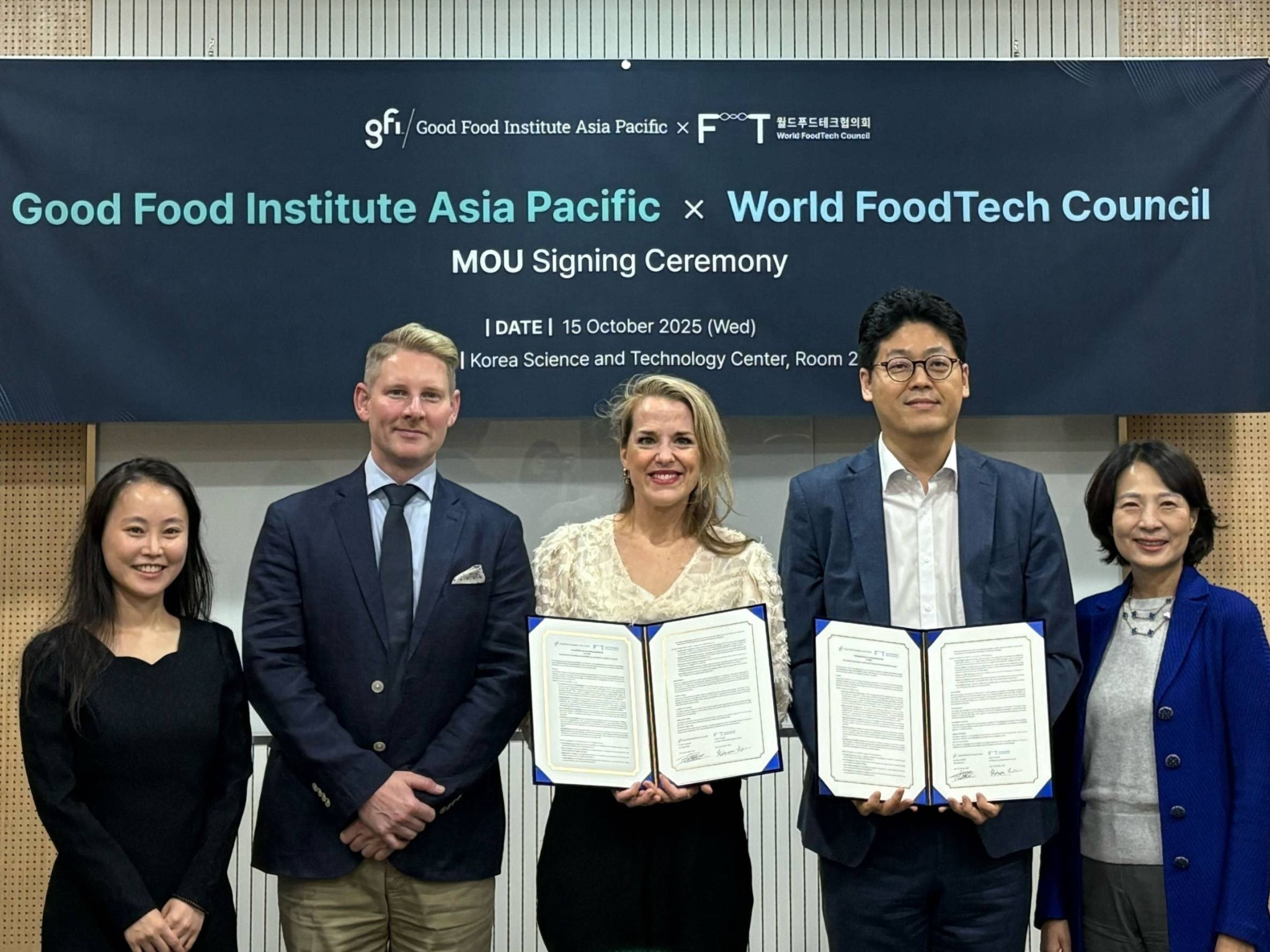
GFI APAC and the World FoodTech Council have signed a new partnership to accelerate innovation in South Korea’s alternative protein ecosystem.
From dairy-free casein and cultivated meat powders to fermented proteins derived from grape yeast, South Korea’s food tech sector is filled with some of the most exciting sustainable protein innovations.
To further accelerate their progress, the country is home to a new partnership between the Good Food Institute (GFI) APAC, a non-profit think tank focused on alternative proteins, and the World FoodTech Council, which comprises over 3,300 members and will host the World FoodTech 2025 Conference in Seoul later this month.
As part of the MoU, the two organisations will get together to support strategic regulatory policies on novel foods in Korea, boost domestic R&D initiatives, and spur new scientific talent development pathways to enable researchers from adjacent fields to contribute to the future food sector.
South Korea’s alternative protein space needs international representation

“For more than a decade, South Korea has invested more money into scientific R&D as a percentage of GDP than any other Asian country – an asset the country is now leveraging to become an alternative protein powerhouse,” said GFI APAC managing director Mirte Gosker.
“Just as Asia was early in understanding the untapped potential of renewable energy technologies to satisfy soaring global demand, every country will inevitably need innovative ways to make more meat with fewer resources – and our region is once again laying the groundwork to sell the world what it needs.”
But despite South Korea’s progress in alternative proteins, there lies a structural gap in the integration of that expertise into global discussions. At this year’s AltProtein Asia event (held at the Bezos Centre for Sustainable Protein in Singapore), stakeholders exchanged knowledge about how to tackle technical bottlenecks hindering taste, scale, and price parity for alternative proteins.
The symposium attracted top scientists from Singapore, China, Japan, Australia, and New Zealand, but not South Korea. GFI APAC is aiming to change that next year, ensuring that the latter country isn’t just present, but also takes a central role in the dialogue.
“South Korea is home to one of Asia’s most advanced tech ecosystems, including 10 biotech innovation and manufacturing clusters, dozens of alternative protein companies, and the highest number of researchers per capita of any country on Earth,” says Yeonjoo La, South Korea startup lead at GFI, who is also working to establish GFI Korea.
“By connecting Korea’s scientists, policymakers, and technologists with their overseas counterparts, we can supercharge plant-based and cultivated meat development, rapidly increase regional regulatory knowledge-sharing, and create an impact far greater than the sum of its parts,” she adds.
Korean government goes big on sustainable proteins

The partnership between GFI APAC and the World FoodTech Council comes as government support for alternative proteins is ramped up in South Korea. The Ministry of Food and Drug Safety, for starters, has established a framework for regulatory approval of these proteins.
Last year, the Ministry of Oceans and Fisheries announced an investment of ₩29B ($21M) in research funding for plant-based and cultivated seafood technologies, and the North Jeolla Province announced that it would open a Food Tech Research Support Center dedicated to plant-based proteins in 2026.
Meanwhile, GFI APAC itself signed an MOU with the Korea Biotechnology Industry Organization and its Bio-based Future Food Industry Committee – a coalition of 33 future food companies – to advance market research and knowledge exchange, increase policy coordination for novel food regulation, facilitate training, and host joint workshops on alternative protein innovation.
Also in 2024, the federal government enacted the Food Tech Industry Promotion Act, which aims to improve citizens’ lives, create jobs and develop the national economy by reinforcing the convergence of food production with cutting-edge technologies. It’s set to come into effect this December.
And earlier this year, Uiseong County won its bid to build a 2,660 sq m Food Tech Research Support Center focused on cultivated meat, backed by public investment to the tune of ₩14.5B ($10M). Opening in 2027, it will help companies develop and scale up their processes, and apply for regulatory approval.
The building will be located next to the existing Cell Culture Industry Support Center. Both are situated inside a special zone in the North Gyeongsang Province, which exempts companies from certain regulatory hurdles to fast-track novel food development.
GFI APAC’s collaboration with the World FoodTech Council aligns with these developments. The latter is focused on establishing global standards, certification support systems, and international cooperation on emerging food technologies.
“Food tech tackles the defining challenges of our era – from population growth and climate change to public health in the age of AI,” said Prof Ki Won Lee, co-chair of the World FoodTech Council. “In partnership with GFI, we are committed to positioning K-food-tech as a key driver of the future food system and a leader in this transformative industry.”
The post New Partnership Aims to Beef Up South Korea’s Future Food Sector appeared first on Green Queen.
This post was originally published on Green Queen.